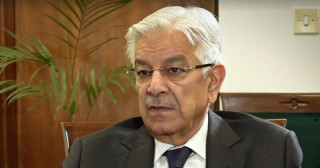Syed Haider Imam
Chief Minister (5k+ posts)
[h=1]KP govt makes a bizarre move to protect schools
[/h] PESHAWAR: In a bizarre move, the elementary and secondary education department has directed all schools that if the concerned watchman is unfit to handle a weapon then he should bring any of his relatives trained for that purpose.
All the district education officers have been communicated the decision taken at a meeting recently held in the secretariat of the department to review security situation.
A circular, issued to the director of elementary and secondary education and all DEOs of the province for immediate implementation, says that the matter of the school Chowkidar (watchman) should be discussed with the parent-teacher councils (PTCs).
The circular available with this scribe says that if the PTC agrees, the watchman will be provided with a shotgun and the DEO concerned should immediately take up the case with the local authorities for issuing a licence in this regard.
[h=4]Education dept directs untrained watchmen to engage relatives knowing use of arms[/h]
“If for some reason the Chowkidar is unfit to handle a shotgun, he will arrange for a relative to perform this duty alongside the Chowkidar,” says the circular.
It says that grills should be installed immediately at the school rooms, which have windows facing other property that is open and vulnerable like roads etc. Besides grills, the windows should be covered with steel mesh, it adds.
“The education department has not bothered to mention in the circular that from where the PTC would arrange fund to purchase a shotgun,” a senior official in the education department said.
He said that education department released Rs 10,000 to PTC annually per classroom for the pity repairs and class consumable items. “There is no other fund with the PTC,” he said.
The fresh directives regarding the security of the schools were issued after attack on the Bacha Khan University Charsadda. “These instructions should be followed in letter and spirit to ensure foolproof security of the schools throughout the province,” the circular says.
Besides the officers of the education department, the circular has also been sent to the inspector general of police, all divisional commissioners, all deputy commissioners, project director
IMU, principal staff officers to chief secretary, additional chief secretary and other administrative secretaries of the department.
Prior to it, the provincial government has also issued standard operating procedures to all educational institutions. According to the SOPs, the headmasters of the schools have been directed to deploy guards, construct the boundary walls, if not constructed, raise its height to 10 feet with fixing barbed wire on it. The SOPs also consist of deployment of security guard, installation of close circuit TV cameras, construction of watchtower and placing barriers in front of the school gate etc.
“It is beyond understanding as to how a headmaster will ask a watchman to bring his relative for holding gun and protecting a government school,” a district education officer told Dawn. He said that he was unable to understand as to why a private person would put his life in danger to protect a school.
He said that the fresh directives showed that the entire responsibility of school security rested with untrained watchman and his relatives. Literally, he said, police and other law enforcement agencies shifted the responsibility of schools’ security to the education department while it (education department) subsequently directed the PTCs to provide gun to the watchmen or their relatives.
So far police have registered over 700 FIRs against the heads of the government and private schools for not implementing the SOPs.
E&SE Secretary Afzal Latif, when contacted, excused himself from talking to media and told this scribe to contact Special Secretary Atif Khan. However, the special secretary didn’t respond despite several attempts by this scribe.
Published in Dawn, February 3rd, 2016
http://www.dawn.com/news/1237140/kp-govt-makes-a-bizarre-move-to-protect-schools
[h=1]Doctors refuse to accept LRH board’s decisions
[/h]PESHAWAR: The Provincial Health Employees Coordination Council, Khyber Pakhtunkhwa (PHECC), has refused to accept decisions taken by the Lady Reading Hospital’s board of governors and threatened to boycott duties if the decisions were not reversed.
Speaking at a news conference at the press club here on Tuesday, the council’s provincial president Dr Musa Kaleem alleged the decisions taken by the BoG Chairman Nausherawan Barki had created unrest among health employees, including doctors.
Accompanied by other representatives of the council, Dr Kaleem said that LRH BoG had failed to take steps for improving health facilities in the hospital rather it was ‘bent upon’ transfer of employees without any reason, and was hiring services of people on fixed wages.
“We will not allow recruitments on the basis of fixed salaries on vacant posts as it is sheer injustice with us,” he warned and said the BoG chairman was not sincere to solve problems facing the health workers, doctors and patients.
http://www.dawn.com/news/1237139/doctors-refuse-to-accept-lrh-boards-decisions
[h=1]Govt asked to restore Local Government Act, 2013
[/h]HARIPUR: The elected village and neighbourhood councillors all over the district have demanded of the government to restore the Local Government Act, 2013 in its original form and enforce it across the province forthwith.
They said that the uncalled for amendments being introduced into the Act had made it worthless.
They voiced it at the “councillors’ convention” organised by the elected nazims of local village and neighbourhood councils at Benazir Bhutto Memorial Hall in the precinct of tehsil municipal administration here on Tuesday.
They called upon the government to stop uncalled for process of amendments being introduced into the Act through executive order, which rendered it useless.
[h=4]Councillors say amendments have made the law worthless[/h]
Malik Faisal Iqbal, district president of Village and Neighbourhood Association (VNA) and nazim of village council Malikyar; Omer Khan, district vice-president of VNA from village council sikandarpur and Abdul Waheed Khan, district general secretary of VNA from Neighbourhood council City 10, were the host of the event.
http://www.dawn.com/news/1237103/govt-asked-to-restore-local-government-act-2013
[h=1]Rs347m uplift budget for Swabi district
[/h]SWABI: The Swabi district government on Monday presented its first Rs347 million development budget for fiscal year 2015-16.
District nazim Ameer Rehman presented the budget in the district assembly. The three-day budget session is being chaired by naib nazim Asar Khan.
Speaking on the occasion, Mr Rehman said the district government had presented its non-development budget soon after assuming power. He said the funds had been equally distributed among treasury and opposition members of the district council.
“The Khyber Pakhtunkhwa government’s prescribed rules and principles have been upheld in the budget making process,” he said. In the development budget, Rs87.4 million each have been set aside for education and communication, Rs43.8 million for health, Rs21.8 million each for agriculture, women welfare and youth and sports.
Besides, Rs63 million have been placed at the disposal of the district government as discretionary funds.
The district nazim said proposals of all the seven parties of the ruling Swabi Democratic Alliance had been considered in the budget
http://www.dawn.com/news/1236935/rs347m-uplift-budget-for-swabi-district
[h=1]Over 1,400 high schools without head in Khyber Pakhtunkhwa
[/h]PESHAWAR: Over 1,400 government high and higher secondary schools, which comes to over half of the total schools in the province, have been functioning without permanent heads since long having a negative impact on the students, according to sources.
In the presence of so many vacant posts of headmasters, the district education officers across the province were compelled to appoint one of the senior teachers as in-charge of the respective school, sources in the Elementary and Secondary Education (E&SE) Department told Dawn.
The headmasters/headmistresses serving in BPS-17 to BPS-20 were appointed as head of the government high and higher secondary schools for boys and girls according to the strength of the students enrolled in the schools. According to the official annual statistic report of the government schools, there are 2,108 high schools, including 722 for girls, and 406 higher secondary schools, including 141 for girls, in the province.
[h=4]Educationist says those working as in-charge don’t own responsibility[/h]
Of the total vacant posts of the headmasters/headmistresses, 601 are in BPS-17, 501 in BPS-18, 316 in BPS-19 and 25 in BPS-20, sources said.
The teachers serving as in-charge couldn’t effectively run the schools administratively and academically due to which students have to suffer, one of the headmasters told Dawn.
“The ownership issue exists in
http://www.dawn.com/news/1236739/over-1400-high-schools-without-head-in-khyber-pakhtunkhwa
[h=1]ADB offers assistance in power sector
[/h] PESHAWAR: The Asian Development Bank (ADB) has offered technical and financial assistance to the Khyber Pakhtunkhwa government in its bid to exploit hydropower potential of the province.
A high-level ADB mission comprising Korean, Australian, Vietnamese, Philippines and Pakistani investors, was informed during a briefing here on Sunday about the ongoing and upcoming hydropower projects in the province. The ADB mission visited Khyber Pakhtunkhwa for making a plan of action to invest in power sector.
Pakhtunkhwa Energy Development Organisation (PEDO) chief executive officer Akbar Ayub Khan informed the ADB mission led by programme manager Adnan Tareen that the provincial government was engaged in implementation of an energy action plan in order to utilise the hydropower potential of the province, according to a statement.
The mission hailed the implementation of 356 micro hydropower projects plan of the provincial government.
Secretary Energy & Power, Engr Naeem Khan was also present on the occasion.
PEDO head said the micro hydropower projects plan was being developed in areas without electricity. ADB plans to introduce for the first time in Pakistan a result-based landing (RBL) technology to complete these projects on a fast-track basis. Moreover, the bank will also invest in development of high capacity power projects in the province with the cooperation of PEDO. It was informed that the ADB mission will visit the province again to finalise the plan of action in consultation with PEDO for executing the hydropower projects in KP.
Published in Dawn, February 1st, 2016
http://www.dawn.com/news/1236733/adb-offers-assistance-in-power-sector
[h=1]Govt to build 70 more schools in Mansehra
[/h]MANSEHRA: Qaumi Watan Party MPA Mohammad Ibrar has said that the Khyber Pakhtunkhwa government would construct 70 schools in Mansehra district during the current year.
“Of the total 70 schools 47 are being built in Tanawal, as the provincial government wants to put backward areas on the path of progress and development through education,” Mr Ibrar told a gathering held in connection with the tree plantation drive in Sawan Mera area on Saturday. He also planted a sapling to launch the plantation drive in Tanawal.
The MPA said that he would not allow anybody to deprive people of his constituency of their rights and that was why work on the 47 schools was being started here soon.
[h=4]MPA launches tree plantation campaign in Tanawal[/h]
He claimed that whatever polices and strategy was being followed to protect forests in the province was devised when he was the forest minister.
http://www.dawn.com/news/1236485/govt-to-build-70-more-schools-in-mansehra
[h=1]Seven KP universities without permanent heads
[/h]PESHAWAR: Seven public sector universities in Khyber Pakhtunkhwa have long been functioning without permanent vice-chancellors showing the PTI government’s disinterest towards the promotion of higher education in the province.
The government had amended the Khyber Pakhtunkhwa Universities Act, 2012, as part of its reforms for education sector but didn’t ensure its enforcement.
The provincial assembly passed the amendments in question on May 8, 2015.
[h=4]Govt says ordinance to be promulgated shortly to fill positions[/h]
According to the officials in the know, the higher education department has been unable to implement the amended law especially its provisions related to the appointment of VCs due to unavailability of suitable candidates.
They told Dawn that those who applied for those posts didn’t fulfil the selection criteria.
The officials said under those circumstances, the department neither fully implemented the law nor did it introduce fresh amendments to it to relax the criteria for the appointment of VCs.
Under Section 12(3) of the law, the process of selection of the new vice-chancellor is to be initiated six months prior to the expiry of the term of the incumbent.
However, the appointment of vice-chancellors to Gomal University Dera Ismail Khan, Hazara University Mansehra, Kohat University of Science and Technology and University of Engineering and Technology Peshawar.
Also, the newly-established Women University Swabi and Science and Technology University Abbottabad are awaiting the appointment of vice-chancellors.
The officials said the appointment of heads to the two varsities was delayed as the higher education department had decided to change the existing recruitment criteria.
Two days ago, the provincial government extended the tenure of UET Vice-Chancellor Imtiaz Hussain Gilani for three months in violation of the law, said officials.
The officials insisted Mr. Gilani holding the position for 12 years had already been given three term extensions for four years each.
According to them, Section 12(6) of the relevant law says, “The Vice-Chancellor shall be appointed for a single tenure of three years on market based salary and fringe benefits depending on qualification and experience of the candidate and his or her suitability to the task.
“The tenure of three years may be extended once for another such term on the basis of performance to be evaluated by government against the key performance indicators to be set up by government. The Vice-Chancellor may work in the same university for a maximum of two such
http://www.dawn.com/news/1236498/seven-kp-universities-without-permanent-heads
[h=1]Culture dept launches scheme to honour artists, writers
[/h] PESHAWAR: In a rare gesture, the Khyber Pakhtunkhwa government hosted around 500 artists, poets, writers and musicians chosen as the Living Human Treasures of the province at the Chief Minister’s House and launched a scheme of giving them monthly honoraria in recognition of their talent and service to society and culture.
Many names, voices and faces, which were familiar yet almost forgotten, were seen under the red canopy on the green lawns of the CM House.
Some artists said they had come to the place for the first time and were overwhelmed with the honour with which they were treated.
[h=4]CM House hosts 500 chosen as Living Human Treasures of the province[/h]
“Though late, we are overjoyed the way the government has owned us and showed this kind gesture to us,” said Ahmed Gul, a senior Pashto folksinger.
Aqal Meena, a famous old Pashto singer, tried to hide her face in white chadar but could not hide her tears as she spoke how this monthly honoraria would help her live old age with decency.
TV artist Sidra got emotional as she spoke of how for three years, she remained bed-ridden and said she was feeling happy to be among the Living Human Treasures of the province.
She said forced to be out of work due to health reasons, the honoraria would help her live with honour and pay her bills.
Syed Mumtaz Ali Shah, a famous and senior radio and TV artist known for his fatherly figure look and enchanting voice by all those familiar with Pashto drama, said he had been sick and his voice was not the same anymore.
He however seemed to be feeling light at how they were owned by the government and supported financially in an honourable manner.
Wagma, another Pashto singer, who had almost lost fight against cancer and poverty, had put on pink lipstick and seemed happy and healthier than before.
She was provided financial assistance earlier by the culture department but this time around, it was more in an honourable manner as she was made to feel it was not charity but a token of recognition of her talent.
There were numerous famous faces having the similar gesture of contentment as they had tea and took photos with Pakistan Tehreek-i-Insaf chairman Imran Khan and their colleagues and fans.
Imran Khan who did not speak about any political issue on the occasion for a change only seemed satisfied with the launch of a scheme to help artists.
He said artists were the opinion-makers in a society and that the artists, who remained original, were the real promoters of culture and arts.
Culture secretary Azam Khan, whose team worked to actualise the scheme within few months, said he felt happy to have made creative community of the province happy.
“It was long overdue keeping in view the wave of terrorism in the province that had affected everyone. More important than the money factor is the recognition of their talent and their dignity, which is important in any society claiming to be civilised,” he said.
Azam Khan said it was time the federal government and International community chip in as these were the minds and hearts that would change the narrative and help in countering militant mindset and help heal an agonised society. It would be a slow but sure process, he said.
The culture department through selection committees consisting of artists, writers and musicians reviewed and selected 500 from their own fields out of around 1,600 applications. Those given certificates and cheques of the Living Human Treasures will receive Rs30,000 per month for around next eight months, said culture director Abdul Basit.
Chief Minister Pervez Khattak, however, announced Rs500 million for setting up an endowment fund to continue financial support and welfare of artists.
He also announced the establishment of culture centres at divisional level to be extended to district level once the process starts.
Salma Shaheen, a famous Pashto poetess and one of the selection committee members, said artists were like blood in the veins of society so if the artists are creative and working those societies lived and contributed to the arts and culture.
She asked the Khyber Pakhtunkhwa government to keep supporting them and also promote Pashto language.
Abaseen Yousafzai, another writer and poet, who was a member of the committee, said culture secretary Azam Khan had empowered them to choose names of those deserving to be called Living Human Treasures of the province without feeling any political pressure and interference.
“Decide keeping only God as your witness,” he narrated the selection process.
Salahuddin, another member, sharing how hard they tried to be just in decisions said if any names were left out, it should be taken as the committee’s fault and that the government should not be blamed for it.
Published in Dawn, January 31st, 2016
http://www.dawn.com/news/1236495/culture-dept-launches-scheme-to-honour-artists-writers
[/h] PESHAWAR: In a bizarre move, the elementary and secondary education department has directed all schools that if the concerned watchman is unfit to handle a weapon then he should bring any of his relatives trained for that purpose.
All the district education officers have been communicated the decision taken at a meeting recently held in the secretariat of the department to review security situation.
A circular, issued to the director of elementary and secondary education and all DEOs of the province for immediate implementation, says that the matter of the school Chowkidar (watchman) should be discussed with the parent-teacher councils (PTCs).
The circular available with this scribe says that if the PTC agrees, the watchman will be provided with a shotgun and the DEO concerned should immediately take up the case with the local authorities for issuing a licence in this regard.
[h=4]Education dept directs untrained watchmen to engage relatives knowing use of arms[/h]
“If for some reason the Chowkidar is unfit to handle a shotgun, he will arrange for a relative to perform this duty alongside the Chowkidar,” says the circular.
It says that grills should be installed immediately at the school rooms, which have windows facing other property that is open and vulnerable like roads etc. Besides grills, the windows should be covered with steel mesh, it adds.
“The education department has not bothered to mention in the circular that from where the PTC would arrange fund to purchase a shotgun,” a senior official in the education department said.
He said that education department released Rs 10,000 to PTC annually per classroom for the pity repairs and class consumable items. “There is no other fund with the PTC,” he said.
The fresh directives regarding the security of the schools were issued after attack on the Bacha Khan University Charsadda. “These instructions should be followed in letter and spirit to ensure foolproof security of the schools throughout the province,” the circular says.
Besides the officers of the education department, the circular has also been sent to the inspector general of police, all divisional commissioners, all deputy commissioners, project director
IMU, principal staff officers to chief secretary, additional chief secretary and other administrative secretaries of the department.
Prior to it, the provincial government has also issued standard operating procedures to all educational institutions. According to the SOPs, the headmasters of the schools have been directed to deploy guards, construct the boundary walls, if not constructed, raise its height to 10 feet with fixing barbed wire on it. The SOPs also consist of deployment of security guard, installation of close circuit TV cameras, construction of watchtower and placing barriers in front of the school gate etc.
“It is beyond understanding as to how a headmaster will ask a watchman to bring his relative for holding gun and protecting a government school,” a district education officer told Dawn. He said that he was unable to understand as to why a private person would put his life in danger to protect a school.
He said that the fresh directives showed that the entire responsibility of school security rested with untrained watchman and his relatives. Literally, he said, police and other law enforcement agencies shifted the responsibility of schools’ security to the education department while it (education department) subsequently directed the PTCs to provide gun to the watchmen or their relatives.
So far police have registered over 700 FIRs against the heads of the government and private schools for not implementing the SOPs.
E&SE Secretary Afzal Latif, when contacted, excused himself from talking to media and told this scribe to contact Special Secretary Atif Khan. However, the special secretary didn’t respond despite several attempts by this scribe.
Published in Dawn, February 3rd, 2016
http://www.dawn.com/news/1237140/kp-govt-makes-a-bizarre-move-to-protect-schools
[h=1]Doctors refuse to accept LRH board’s decisions
[/h]PESHAWAR: The Provincial Health Employees Coordination Council, Khyber Pakhtunkhwa (PHECC), has refused to accept decisions taken by the Lady Reading Hospital’s board of governors and threatened to boycott duties if the decisions were not reversed.
Speaking at a news conference at the press club here on Tuesday, the council’s provincial president Dr Musa Kaleem alleged the decisions taken by the BoG Chairman Nausherawan Barki had created unrest among health employees, including doctors.
Accompanied by other representatives of the council, Dr Kaleem said that LRH BoG had failed to take steps for improving health facilities in the hospital rather it was ‘bent upon’ transfer of employees without any reason, and was hiring services of people on fixed wages.
“We will not allow recruitments on the basis of fixed salaries on vacant posts as it is sheer injustice with us,” he warned and said the BoG chairman was not sincere to solve problems facing the health workers, doctors and patients.
http://www.dawn.com/news/1237139/doctors-refuse-to-accept-lrh-boards-decisions
[h=1]Govt asked to restore Local Government Act, 2013
[/h]HARIPUR: The elected village and neighbourhood councillors all over the district have demanded of the government to restore the Local Government Act, 2013 in its original form and enforce it across the province forthwith.
They said that the uncalled for amendments being introduced into the Act had made it worthless.
They voiced it at the “councillors’ convention” organised by the elected nazims of local village and neighbourhood councils at Benazir Bhutto Memorial Hall in the precinct of tehsil municipal administration here on Tuesday.
They called upon the government to stop uncalled for process of amendments being introduced into the Act through executive order, which rendered it useless.
[h=4]Councillors say amendments have made the law worthless[/h]
Malik Faisal Iqbal, district president of Village and Neighbourhood Association (VNA) and nazim of village council Malikyar; Omer Khan, district vice-president of VNA from village council sikandarpur and Abdul Waheed Khan, district general secretary of VNA from Neighbourhood council City 10, were the host of the event.
http://www.dawn.com/news/1237103/govt-asked-to-restore-local-government-act-2013
[h=1]Rs347m uplift budget for Swabi district
[/h]SWABI: The Swabi district government on Monday presented its first Rs347 million development budget for fiscal year 2015-16.
District nazim Ameer Rehman presented the budget in the district assembly. The three-day budget session is being chaired by naib nazim Asar Khan.
Speaking on the occasion, Mr Rehman said the district government had presented its non-development budget soon after assuming power. He said the funds had been equally distributed among treasury and opposition members of the district council.
“The Khyber Pakhtunkhwa government’s prescribed rules and principles have been upheld in the budget making process,” he said. In the development budget, Rs87.4 million each have been set aside for education and communication, Rs43.8 million for health, Rs21.8 million each for agriculture, women welfare and youth and sports.
Besides, Rs63 million have been placed at the disposal of the district government as discretionary funds.
The district nazim said proposals of all the seven parties of the ruling Swabi Democratic Alliance had been considered in the budget
http://www.dawn.com/news/1236935/rs347m-uplift-budget-for-swabi-district
[h=1]Over 1,400 high schools without head in Khyber Pakhtunkhwa
[/h]PESHAWAR: Over 1,400 government high and higher secondary schools, which comes to over half of the total schools in the province, have been functioning without permanent heads since long having a negative impact on the students, according to sources.
In the presence of so many vacant posts of headmasters, the district education officers across the province were compelled to appoint one of the senior teachers as in-charge of the respective school, sources in the Elementary and Secondary Education (E&SE) Department told Dawn.
The headmasters/headmistresses serving in BPS-17 to BPS-20 were appointed as head of the government high and higher secondary schools for boys and girls according to the strength of the students enrolled in the schools. According to the official annual statistic report of the government schools, there are 2,108 high schools, including 722 for girls, and 406 higher secondary schools, including 141 for girls, in the province.
[h=4]Educationist says those working as in-charge don’t own responsibility[/h]
Of the total vacant posts of the headmasters/headmistresses, 601 are in BPS-17, 501 in BPS-18, 316 in BPS-19 and 25 in BPS-20, sources said.
The teachers serving as in-charge couldn’t effectively run the schools administratively and academically due to which students have to suffer, one of the headmasters told Dawn.
“The ownership issue exists in
http://www.dawn.com/news/1236739/over-1400-high-schools-without-head-in-khyber-pakhtunkhwa
[h=1]ADB offers assistance in power sector
[/h] PESHAWAR: The Asian Development Bank (ADB) has offered technical and financial assistance to the Khyber Pakhtunkhwa government in its bid to exploit hydropower potential of the province.
A high-level ADB mission comprising Korean, Australian, Vietnamese, Philippines and Pakistani investors, was informed during a briefing here on Sunday about the ongoing and upcoming hydropower projects in the province. The ADB mission visited Khyber Pakhtunkhwa for making a plan of action to invest in power sector.
Pakhtunkhwa Energy Development Organisation (PEDO) chief executive officer Akbar Ayub Khan informed the ADB mission led by programme manager Adnan Tareen that the provincial government was engaged in implementation of an energy action plan in order to utilise the hydropower potential of the province, according to a statement.
The mission hailed the implementation of 356 micro hydropower projects plan of the provincial government.
Secretary Energy & Power, Engr Naeem Khan was also present on the occasion.
PEDO head said the micro hydropower projects plan was being developed in areas without electricity. ADB plans to introduce for the first time in Pakistan a result-based landing (RBL) technology to complete these projects on a fast-track basis. Moreover, the bank will also invest in development of high capacity power projects in the province with the cooperation of PEDO. It was informed that the ADB mission will visit the province again to finalise the plan of action in consultation with PEDO for executing the hydropower projects in KP.
Published in Dawn, February 1st, 2016
http://www.dawn.com/news/1236733/adb-offers-assistance-in-power-sector
[h=1]Govt to build 70 more schools in Mansehra
[/h]MANSEHRA: Qaumi Watan Party MPA Mohammad Ibrar has said that the Khyber Pakhtunkhwa government would construct 70 schools in Mansehra district during the current year.
“Of the total 70 schools 47 are being built in Tanawal, as the provincial government wants to put backward areas on the path of progress and development through education,” Mr Ibrar told a gathering held in connection with the tree plantation drive in Sawan Mera area on Saturday. He also planted a sapling to launch the plantation drive in Tanawal.
The MPA said that he would not allow anybody to deprive people of his constituency of their rights and that was why work on the 47 schools was being started here soon.
[h=4]MPA launches tree plantation campaign in Tanawal[/h]
He claimed that whatever polices and strategy was being followed to protect forests in the province was devised when he was the forest minister.
http://www.dawn.com/news/1236485/govt-to-build-70-more-schools-in-mansehra
[h=1]Seven KP universities without permanent heads
[/h]PESHAWAR: Seven public sector universities in Khyber Pakhtunkhwa have long been functioning without permanent vice-chancellors showing the PTI government’s disinterest towards the promotion of higher education in the province.
The government had amended the Khyber Pakhtunkhwa Universities Act, 2012, as part of its reforms for education sector but didn’t ensure its enforcement.
The provincial assembly passed the amendments in question on May 8, 2015.
[h=4]Govt says ordinance to be promulgated shortly to fill positions[/h]
According to the officials in the know, the higher education department has been unable to implement the amended law especially its provisions related to the appointment of VCs due to unavailability of suitable candidates.
They told Dawn that those who applied for those posts didn’t fulfil the selection criteria.
The officials said under those circumstances, the department neither fully implemented the law nor did it introduce fresh amendments to it to relax the criteria for the appointment of VCs.
Under Section 12(3) of the law, the process of selection of the new vice-chancellor is to be initiated six months prior to the expiry of the term of the incumbent.
However, the appointment of vice-chancellors to Gomal University Dera Ismail Khan, Hazara University Mansehra, Kohat University of Science and Technology and University of Engineering and Technology Peshawar.
Also, the newly-established Women University Swabi and Science and Technology University Abbottabad are awaiting the appointment of vice-chancellors.
The officials said the appointment of heads to the two varsities was delayed as the higher education department had decided to change the existing recruitment criteria.
Two days ago, the provincial government extended the tenure of UET Vice-Chancellor Imtiaz Hussain Gilani for three months in violation of the law, said officials.
The officials insisted Mr. Gilani holding the position for 12 years had already been given three term extensions for four years each.
According to them, Section 12(6) of the relevant law says, “The Vice-Chancellor shall be appointed for a single tenure of three years on market based salary and fringe benefits depending on qualification and experience of the candidate and his or her suitability to the task.
“The tenure of three years may be extended once for another such term on the basis of performance to be evaluated by government against the key performance indicators to be set up by government. The Vice-Chancellor may work in the same university for a maximum of two such
http://www.dawn.com/news/1236498/seven-kp-universities-without-permanent-heads
[h=1]Culture dept launches scheme to honour artists, writers
[/h] PESHAWAR: In a rare gesture, the Khyber Pakhtunkhwa government hosted around 500 artists, poets, writers and musicians chosen as the Living Human Treasures of the province at the Chief Minister’s House and launched a scheme of giving them monthly honoraria in recognition of their talent and service to society and culture.
Many names, voices and faces, which were familiar yet almost forgotten, were seen under the red canopy on the green lawns of the CM House.
Some artists said they had come to the place for the first time and were overwhelmed with the honour with which they were treated.
[h=4]CM House hosts 500 chosen as Living Human Treasures of the province[/h]
“Though late, we are overjoyed the way the government has owned us and showed this kind gesture to us,” said Ahmed Gul, a senior Pashto folksinger.
Aqal Meena, a famous old Pashto singer, tried to hide her face in white chadar but could not hide her tears as she spoke how this monthly honoraria would help her live old age with decency.
TV artist Sidra got emotional as she spoke of how for three years, she remained bed-ridden and said she was feeling happy to be among the Living Human Treasures of the province.
She said forced to be out of work due to health reasons, the honoraria would help her live with honour and pay her bills.
Syed Mumtaz Ali Shah, a famous and senior radio and TV artist known for his fatherly figure look and enchanting voice by all those familiar with Pashto drama, said he had been sick and his voice was not the same anymore.
He however seemed to be feeling light at how they were owned by the government and supported financially in an honourable manner.
Wagma, another Pashto singer, who had almost lost fight against cancer and poverty, had put on pink lipstick and seemed happy and healthier than before.
She was provided financial assistance earlier by the culture department but this time around, it was more in an honourable manner as she was made to feel it was not charity but a token of recognition of her talent.
There were numerous famous faces having the similar gesture of contentment as they had tea and took photos with Pakistan Tehreek-i-Insaf chairman Imran Khan and their colleagues and fans.
Imran Khan who did not speak about any political issue on the occasion for a change only seemed satisfied with the launch of a scheme to help artists.
He said artists were the opinion-makers in a society and that the artists, who remained original, were the real promoters of culture and arts.
Culture secretary Azam Khan, whose team worked to actualise the scheme within few months, said he felt happy to have made creative community of the province happy.
“It was long overdue keeping in view the wave of terrorism in the province that had affected everyone. More important than the money factor is the recognition of their talent and their dignity, which is important in any society claiming to be civilised,” he said.
Azam Khan said it was time the federal government and International community chip in as these were the minds and hearts that would change the narrative and help in countering militant mindset and help heal an agonised society. It would be a slow but sure process, he said.
The culture department through selection committees consisting of artists, writers and musicians reviewed and selected 500 from their own fields out of around 1,600 applications. Those given certificates and cheques of the Living Human Treasures will receive Rs30,000 per month for around next eight months, said culture director Abdul Basit.
Chief Minister Pervez Khattak, however, announced Rs500 million for setting up an endowment fund to continue financial support and welfare of artists.
He also announced the establishment of culture centres at divisional level to be extended to district level once the process starts.
Salma Shaheen, a famous Pashto poetess and one of the selection committee members, said artists were like blood in the veins of society so if the artists are creative and working those societies lived and contributed to the arts and culture.
She asked the Khyber Pakhtunkhwa government to keep supporting them and also promote Pashto language.
Abaseen Yousafzai, another writer and poet, who was a member of the committee, said culture secretary Azam Khan had empowered them to choose names of those deserving to be called Living Human Treasures of the province without feeling any political pressure and interference.
“Decide keeping only God as your witness,” he narrated the selection process.
Salahuddin, another member, sharing how hard they tried to be just in decisions said if any names were left out, it should be taken as the committee’s fault and that the government should not be blamed for it.
Published in Dawn, January 31st, 2016
http://www.dawn.com/news/1236495/culture-dept-launches-scheme-to-honour-artists-writers






































































































































